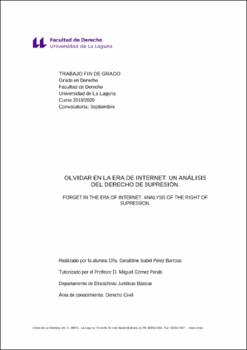Olvidar en la era de internet: un análisis del derecho de supresión
Date
2020Abstract
In this work we will analyze the right to erasure ("to be forgotten")
on the internet. First, we will make a brief analysis of how this right has
arisen and its consideration within the right to the protection of personal
data. In addition, we will talk about how this right has been recognized both
at the Spanish and European level, including it in state and community
regulations. Second, we will proceed to study in depth the right to be
forgotten, its principles, how to exercise it, and the response that the courts
have given. We will also consider how it can affect other rights, such as the
rights to freedom of information and expression. Finally, we will influence
the relationship of this right with search engines, seeing the conflict that
arose between Google and the National Court of Spain and how the
Superior Court of Justice of the European Union resolved it, as well as the
new considerations that it has had this right as a result of this ruling and the
new European Data Protection Regulation En este trabajo analizaremos el derecho de supresión (“al olvido”)
en internet. Primeramente, haremos un breve análisis de cómo ha surgido
este derecho y su consideración dentro del derecho a la protección de datos
personales. Además, hablaremos de cómo se ha reconocido tanto a nivel
español como europeo este derecho, incluyéndose en la normativa estatal y
comunitaria. En segundo lugar, se procederá a estudiar en profundidad el
derecho al olvido, sus principios, cómo ejercerlo, y la respuesta que han
dado los tribunales. Así también consideraremos cómo puede afectar a
otros derechos, como son los derechos a la libertad de información y
expresión. Por último, incidiremos en la relación de este derecho con los
motores de búsqueda, viendo el conflicto surgido entre Google y la
Audiencia Nacional de España y cómo lo resolvió el Tribunal Superior de
Justicia de la Unión Europea, así también las nuevas consideraciones que
ha tenido este derecho a raíz de esta sentencia y el nuevo Reglamento
Europeo de Protección de datos.





